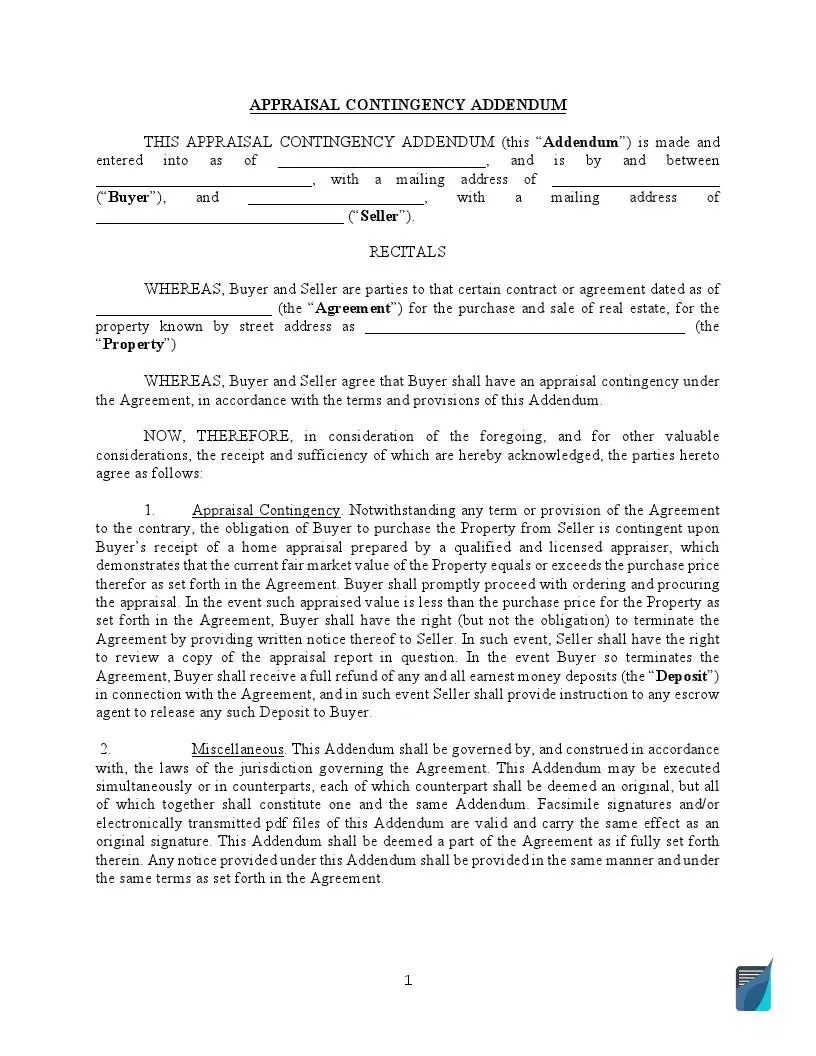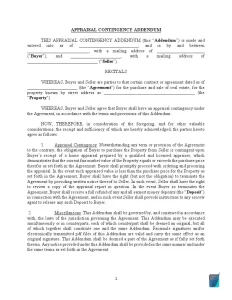Appraisal Contingency Addendum Form
Buying a home can be stressful. There might be circumstances that you never could have predicted and you might find that you run into issues related to the sale that can affect the overall value of the home. Being sure of the value of the home that you are buying is an important part of the buying process for many people.
If you have found out that the home you are thinking of buying is not going to be appraised at the value of the purchase price of the home, you might have the ability to back out of the sale. Not many people know about this important option for your purchase process and you should make sure that you are aware of this contingency option before you buy.

Build Your Document
Answer a few simple questions to make your document in minutes
Save and Print
Save progress and finish on any device, download and print anytime
Sign and Use
Your valid, lawyer-approved document is ready
- What is an Appraisal Contingency Addendum?
- Why is it Beneficial to Use an Appraisal Contingency?
- When to Refuse an Appraisal Contingency
- How to Deal with a Low Appraisal
- Buyer’s Options
- Seller’s Options
- What Information Should Be Included in the Addendum?
- Filling Out the Appraisal Contingency Addendum Template
What is an Appraisal Contingency Addendum?
An appraisal contingency clause is a provision that you can insert into the purchase contract that will allow you to back out of the contract if the home that you want to buy does not appraise at the right price. These contingencies are a good idea to put into place if you are going to be financing a home where home prices are volatile or you have questions about whether or not the home will be assessed at the value that you expect.
This can be a great benefit if you are going to buy a home that you know is a fixer-upper, but you are worried that you cannot finance the home for the right value. Appraisals are an essential part of the home buying process but you will have no control over the value that an appraiser assigns to your home during the appraisal process.
Why is it Beneficial to Use an Appraisal Contingency?
This addendum to real estate purchase contract can be very helpful in cases where you want a safety net for your purchase process. It can be hard to assess the value of a home that might need some work done to it, or you might be worried about the nature of the values that are assigned to other homes in the area.
In situations where the seller is firm on the sales price but you think that it might not be realistic, this document will allow you the security to back out of the sale if the home is not assessed at the value you expect. This can be a very big help when working with a difficult seller, or when buying a volatile market.
When to Refuse an Appraisal Contingency
There are some occasions where an appraisal contingency might not be needed.
- When you are paying cash for the property.
- When the buyer has enough cash to make a down payment that is in excess of 20% of the purchase price.
- When the seller is offering to finance so the buyer does not have to locate a lender for the purchase.
- When the buyer is buying the property to redevelop it so the appraised value is less important.
These are the most common reasons why you might waive an appraisal contingency. You should always consider your unique situation before you make this kind of decision so that you are not sorry that you waived the safety net protecting you from buying a property that does not have the value you have hoped for.
How to Deal with a Low Appraisal
As stated before, you cannot control the appraiser’s evaluation of the property that you want to buy. If the property is appraised at a value that is worth less than the price that is included in the contract for the purchase price, this can cause major problems for you as the buyer or for the lender that is going to be carrying your loan.
Either party can seek a different appraiser to look at the value of the property. If the appraisal comes in low again, you have some options to deal with the poor appraised value of the home.
Buyer’s Options
There are a few things that you can do if the home that you want to buy has been assessed at a value that is lower than you expected.
- Put down a larger down payment
- Get another appraisal
- Negotiate with the seller to lower the purchase price to bring it into line with the appraised value
- Use the contingency to back out of the sale.
Seller’s Options
There are fewer options for the homeowner when this is the end result of the appraisal process. This can be a tough spot to find yourself in as the homeowner trying to sell your home. You can do the following when your home is appraised for a value that is much lower than you thought it would be:
- Renegotiate and lower the sales price of your home
- Fix problems that caused the value of your home to be reduced
- Extend the buyer financing to avoid the issue of a lender being unwilling to grant a loan for the reduced value of the home
The last option is the riskiest and many people will not and should not take this option. If you want to be sure that your home will sell despite a low appraisal amount, you will probably choose to renegotiate the price of the home.
What Information Should Be Included in the Addendum?
Your unique situation might influence the information that is included in your addendum. These addendums are also state-specific. However, these are the basic items that will need to be included:
- The terms related to the process of allowing the buyer to back out of the sale
- The number of days that the buyer can choose to back out of the sale
- The chance for the seller to lower the price to meet the appraisal amount
- The release date that the buyer must notify of issues with the appraisal
If none of these considerations are met by the buyer, the contingency will be deemed satisfied and the sale will proceed.

Filling Out the Appraisal Contingency Addendum Template
Paperwork can be tedious to fill out, but this is not a difficult form to complete. You are recommended to follow the next few steps to get the document ready in a matter of minutes.
- Define the parties
Both buyer and seller should be defined at the top of the addendum. It’s necessary to fill out their names and mailing addresses. This contact information must be the same as in the real estate purchase agreement to which the addendum is attached.
- Indicate the date
The date of the original agreement for the purchase and sale of real estate must be indicated in the addendum.
- Identify the property
You are expected to identify the address of the property in question. This property is subject to the real estate purchase contract and will be appraised in the future.
- Sign the document
When all the necessary particulars have been filled out, both parties are required to sign the document, including their names and titles. They will find the appropriate fields at the end of the addendum.
The appraisal contingency addendum consists of the buyer’s right to terminate the contract if the appraised value is less than the purchase price. In this case, the buyer will have to provide the seller with a written notice. The seller, in their turn, will be obliged to return all earnest money deposits in connection with the existing agreement.
Using the appraisal contingency addendum is an essential part of the home buying process, and it can make the difference between an easy sales process and one that does not work out for either party.